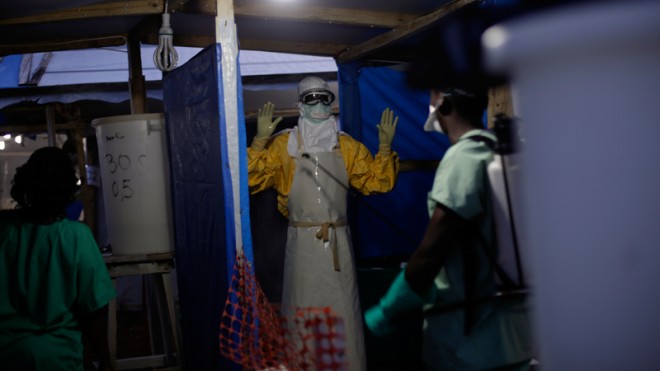British scientists trial 15-minute Ebola test in Guinea

In this picture taken Thursday Nov. 20, 2014, an MSF Ebola heath worker is sprayed as he leaves the contaminated zone at the Ebola treatment centre in Gueckedou, Guinea. Officials in Guinea say bandits during a roadside robbery stole a cooler containing blood samples that are believed to have Ebola, from a vehicle traveling from Kankan prefecture in central Guinea to a test site in Gueckedou, in the south.(AP Photo/Jerome Delay)
GUINEA – British researchers are to conduct trials in Guinea on a 15-minute Ebola test, the Wellcome Trust and UK government said in a joint statement Friday.
The prototype is six times faster than current tests and aims to speed up diagnosis, the London-based global research charity and the Department for International Development said.
“A reliable, 15-minute test that can confirm cases of Ebola would be a key tool for effective management of the Ebola outbreak, allowing patients to be identified, isolated and cared for as soon as possible,” said Val Snewin of the Wellcome Trust.
She said the test was designed to be suitable for remote field hospitals where electricity and cold storage are often scarce.
Early detection of Ebola leads to better infection control as medics can identify and isolate confirmed cases faster and start treating patients sooner.
Article continues after this advertisementThe trials will be led by researchers from Dakar’s Pasteur Institute at an Ebola treatment centre in the Guinean capital Conakry in the coming weeks.
Article continues after this advertisementBritain already has an Ebola laboratory in Sierra Leone and is building two others in its former colony.
“Together these will quadruple the number of tests that can be carried out every day and help contain the spread of Ebola,” International Development Secretary Justine Greening said in the statement.
The biggest Ebola epidemic on record has claimed around 5,700 lives in west Africa since the beginning of the year, according to the World Health Organization — almost all of them in Guinea, Liberia and Sierra Leone.
In October France’s Atomic Energy Commission announced that another 15-minute test had proved effective in high-security laboratory trials, although it has not yet been validated by regulators.
The diagnostic tool works by antibodies reacting to the presence of the virus in a tiny sample, which can be a drop of blood, plasma or urine, it said.
A European pharma company Vedalab is turning the prototype into a user-friendly kit called eZYSCREEN that will see a positive result yield a small stripe in a results window on the hand-held device.
Other pharmaceutical teams are working on fast diagnostic tools for Ebola. They include Primerdesign, a spinoff company of Britain’s University of Southampton, and Corgenix Medical Corp of the United States.
Work is also under way in several laboratories on developing a vaccine or cure for the killer hemorrhagic fever against which no specific drug treatment exists.
RELATED STORY